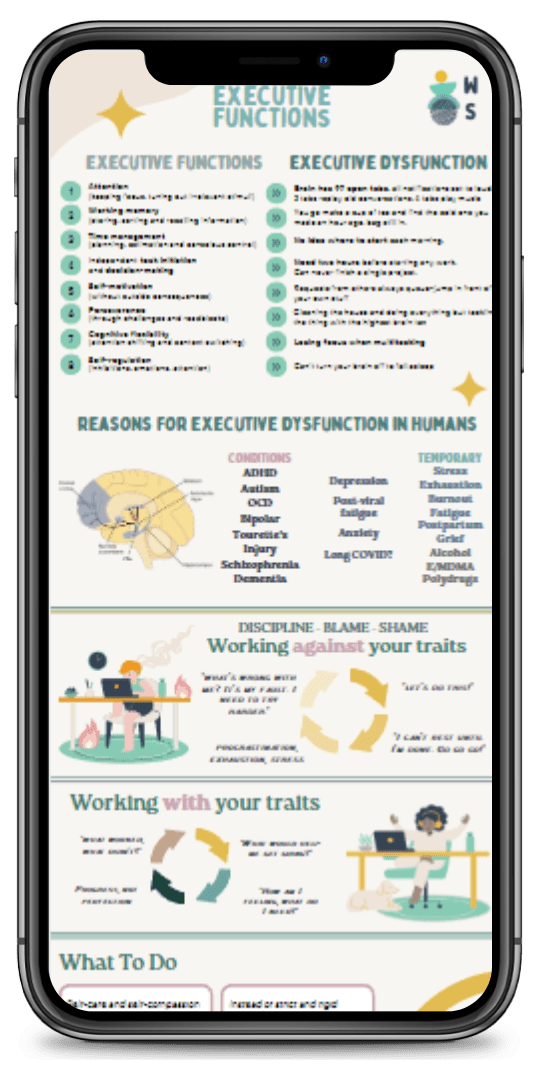Executive functions are cognitive processes in charge of planning, problem-solving, attention, and self-regulation.
Executive functions are essential, they help us make plans, stay organized, pay attention, and keep our emotions in check. It plays a big role in making decisions and adapting to new situations.
Dopamine is one of the neurotransmitters that is closely linked to executive functioning. Dopamine helps to regulate attention, motivation, and reward-based learning, which are all essential components of executive functioning.
Why does executive dysfunction happen?
Executive dysfunction can happen when these processes have a difference or impairment that affects everyday life.
Executive dysfunction can manifest temporarily for many reasons, like burnout, depression, and grief. It can also be a result of an acquired condition like post-viral syndrome (from Long Covid, EBV/Mono), or fatigue-related conditions like ME/CFS, PEM and fibromyalgia.
But for many neurodivergent conditions, especially Autism and ADHD, it has a life-long presence.
What does executive dysfunction look like?
- Procrastination, doing everything but the thing
- Laziness, not moving, just sitting around, playing with their phone
- Carelessness, as if it’s not important, and the person is not interested in doing the thing
- Running around in a frenzy, agitated, irritated, snappy
- Forgetfulness, not remembering things that were said to them, constantly losing their things
- They are distracted, start talking about different topics mid-sentence, and interrupt what they are doing with something different
What does executive dysfunction feel like?
- You’re overwhelmed by the amount of tasks to do, and not knowing the next step, so you can’t even start doing anything
- Feeling a sense of urgency, trying to catch up with things, feeling like you’re constantly behind
- Starting many tasks at the same time (often not the ones you should / want to do), nothing is finished
- Not being able to progress with your tasks and still feeling exhausted from trying
- Trying to concentrate and focus, but being distracted all the time, and hating yourself for it
Executive dysfunction and ADHD
Executive dysfunction is one of the most important traits of ADHD1, because it affects so many areas of daily life. But is also one of the most prejudiced against.
It is very easy to regard executive dysfunction struggles as laziness or carelessness, and make a moral judgement on a person for struggling.
A person with executive dysfunction can easily believe they are just not trying hard enough, they are a moral failure and having this kind of internalized shame can very easily lead to confidence issues and negative self-talk.
And when you believe it is your personal failing that you are not feeling well, it is harder to ask for help, especially from people who question your needs in the first place.
Unlock your understanding of neurodivergence with our guide to executive functions!
- What are the 8 executive functions and how can you tell when they don’t work as expected?
- How executive dysfunctions can be temporary or long-term
- Why the behavioural approach to executive functioning creates a completely useless negative feedback loop for neurodivergent people?
- The quick & easy positive feedback loop you can use to break the discipline-blame-shame cycle
Download our Friendly Introduction to Executive Functions guide from The Library, our free resource hub.

Related terms
cognitive load
Cognitive load refers to the total amount of mental effort being used at any given time.
For neurodivergent people, activities that others might find automatic (like maintaining expected facial expressions or processing background noise) can …
waiting mode
Waiting mode is a psychological state characterized by heightened anticipation or anxiety while awaiting a specific outcome or event.
In the neurodivergent, especially ADHD community it usually means the period before an event that needs focus or …
transitions
Transitioning, in the context of neurodiversity, refers to the process of moving from one state, activity, or place to another. It involves a shift in attention, focus, and cognitive resources.
For neurodivergent individuals, it may require …
context switching
Context switching refers to the cognitive process of shifting attention between different tasks or mental states. It involves disengaging from one task and engaging in another, requiring the brain to change its focus, rules, and objectives.
This …
ADHD paralysis
ADHD paralysis is a form of executive dysfunction.
It refers to the difficulty in initiating, continuing, or completing tasks, even when the person understands the urgency and importance, and also has the ability to do the task. ADHD paralysis can …
working memory
Working memory is one of the executive functions. It is our mental scratchpad, where we temporarily hold and play with info to help with tasks like problem-solving and learning. It’s key for everyday stuff but has limited space, so juggling …
emotional regulation
Emotional dysregulation refers to difficulty in effectively managing and controlling one’s emotions. It is characterized by intense, unpredictable, or seemingly disproportionate emotional responses that may be challenging to regulate or modulate. …
time blindness
Time blindness is when it’s tough to grasp the passing of time. It usually means you under- or overestimate the time a project will take. It makes it tricky to manage schedules, deadlines, and planning. It can lead to procrastination, forgetfulness, …
body doubling
Body doubling means doing a task or errand with someone else or in the presence of someone else so it’s easier to start or follow through.
Their supportive presence helps create a safe, anchoring environment that makes it easier to start and follow …



